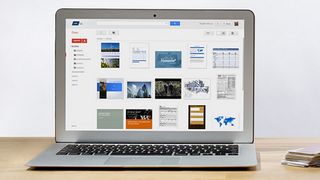Moving business applications to the cloud: a case study
The pros and cons of taking the plunge

We've been busy assessing every aspect of the cloud on TechRadar Pro recently, with a particular focus on how SMBs can best harness the technology.
One obvious way of tapping into the cloud is transferring business applications away from a traditional desktop environment and instead adopting services like Microsoft's Office 365 and Google Apps. To get a first-hand account of what it takes to make such a move, we grilled Emma Davies, marketing and PR manager at digital agency I-COM, in this Q&A.
TechRadar Pro: What were the drivers behind your decision to move away from desktop applications to hosted services such as Office 365 or Google Docs?
Emma Davies: We were initially slightly concerned about the move to hosted business services. As a business this is a huge decision and would have a big affect on everyone. We thought about it for quite a while and always came back to the same conclusion: Going Google was right for us.
This was initially because of the manageability and scalability of the hosted services but also because we knew we were delaying the inevitable, and at some point the services would become so popular and robust we would have to move, so why not do it now and reap the rewards sooner?
Other drivers for us included easy email management, improved shared calendars and document collaboration and streamlined services throughout the business. All of these together ultimately save us time and money, so a big driver for an SMB.
TRP: Can you outline the key advantages your business has gained by moving away from desktop applications?
Are you a pro? Subscribe to our newsletter
Sign up to the TechRadar Pro newsletter to get all the top news, opinion, features and guidance your business needs to succeed!
ED: By far the best advantage for us is the constant improvements. With desktop services we only had the budget to upgrade our systems every three years but with Google Apps the updates are regular and easily adaptable. The drip feed affect helps us to consume each feature easily, whereas before we would get all the new features at once, with most of us only using a handful of them.
The other key advantage to Google Apps is it puts us on a level playing field with tech rich companies and enables us to compete with them. With desktop services our systems weren't advanced enough to do this and we didn't have the same level of investment to compete.
The hosted services also put us in a good position with clients - we're seen as moving with the times and in some cases ahead of the times, which is perfect for a digital agency.
Finally, the smooth transition through devices is excellent and a huge advantage for us. We can move from desktop to phone to laptop and back seamlessly allowing you to work on the move and be more efficient.
TRP: What is your advice to business owners who are thinking of moving their office suites online and also embracing other hosted business services?
ED: First and foremost they need to invest in good internet connectivity. We had to invest a lot more into this and make sure we have all the fail-safes in place.
Secondly, each company needs to make the right choice between Office 365 and Google Apps - some companies will not be suited to the style of Google Apps and the mindset of their staff will determine this.
Google Apps seems to be a natural fit for us as an agency as we're constantly improving and always looking for innovative ways to make us ahead of competitors, whereas larger corporates, who have always used Microsoft Office, will be better suited to Office 365 and the way it works.
They also need to make sure staff are communicated to throughout regarding the changes ahead, and asked to take a positive approach to the move. Without the staff on board it becomes very difficult. There are many hiccups in the beginning so everyone needs to be aware of this.
Most Popular

